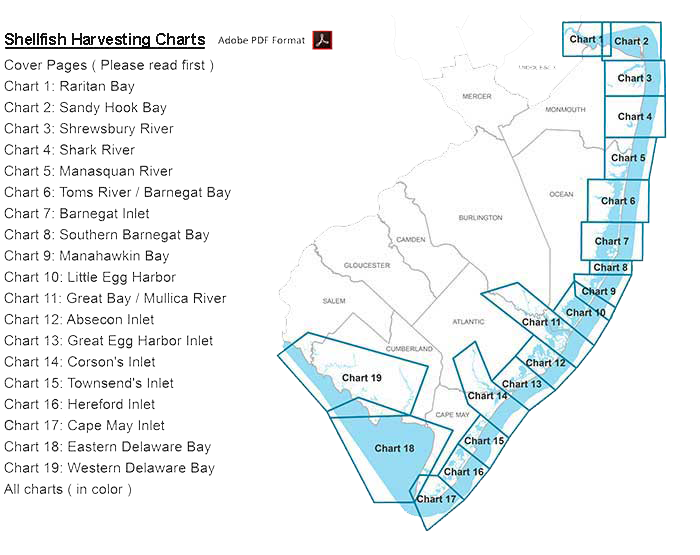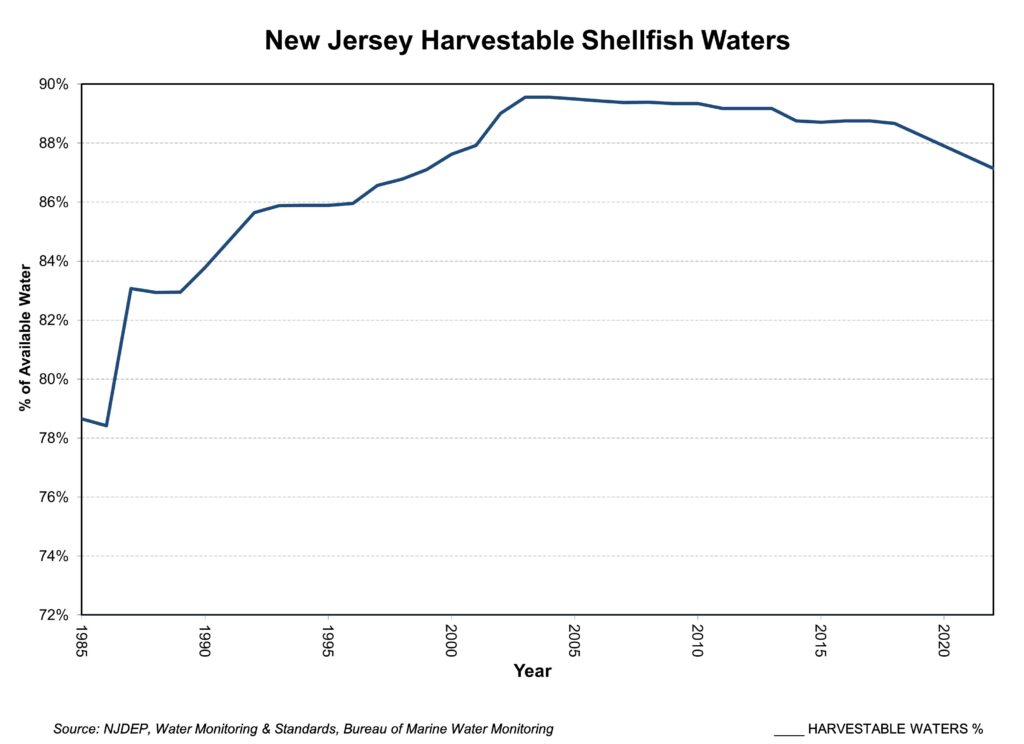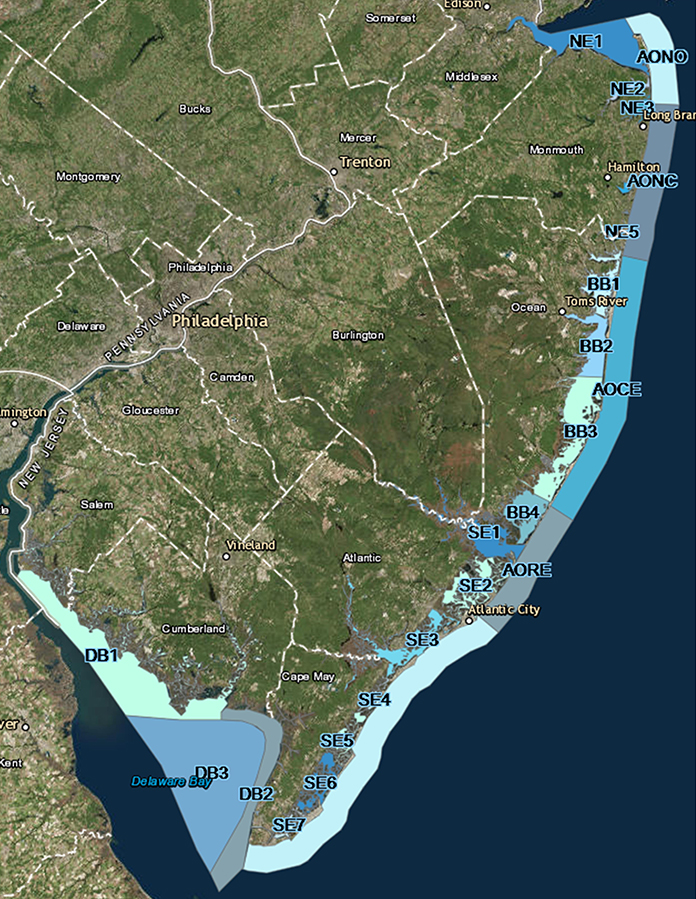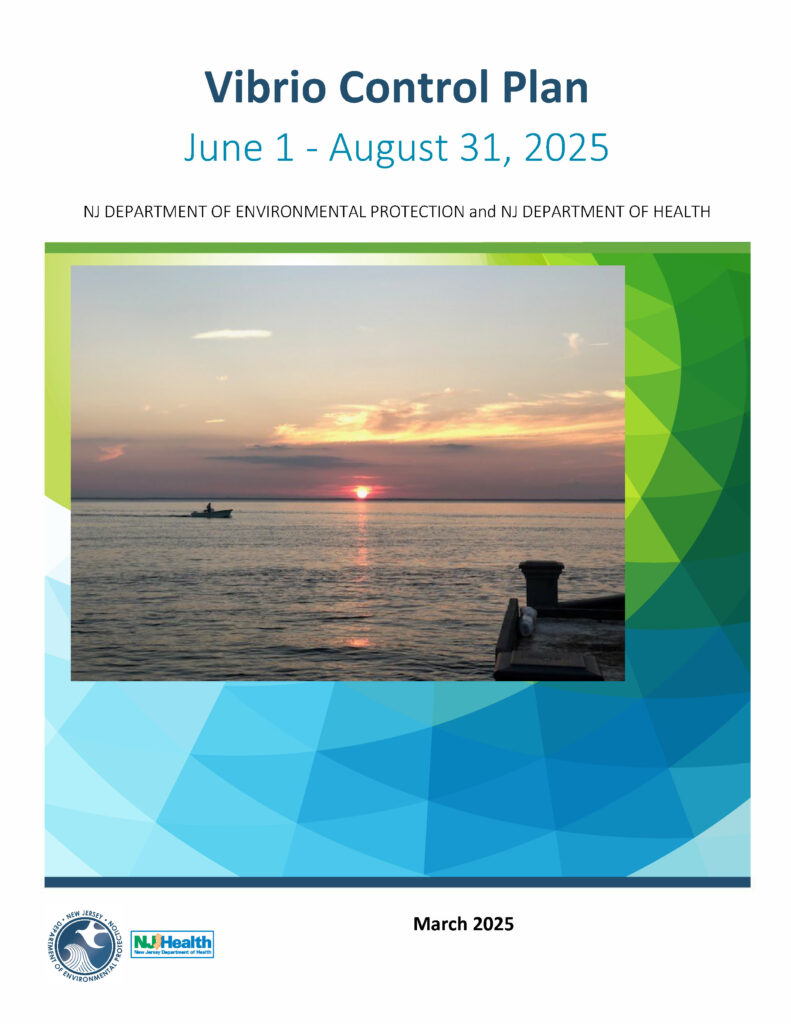National Shellfish Sanitation Program (NSSP)
The Bureau of Marine Water Monitoring classifies shellfish growing waters and determines whether and how the harvest of shellfish from those waters must be restricted in order to protect the public from health risks associated with the consumption of shellfish. The Bureau has the authority to impose immediate shellfish harvest suspensions and restrictions to protect public health. In addition, the Bureau issues permits for shellfish harvesting; develops control plans; and sets requirements for shellfish license holders for the harvest, handling, and transport of shellfish. This ensures New Jersey harvested shellfish are safe for human consumption.
New Jersey participates in the National Shellfish Sanitation Program (NSSP), which is recognized by the Interstate Shellfish Sanitation Conference (ISSC; New Jersey is a member of the conference) and the U.S. Food and Drug Administration (FDA). The NSSP, among other things, develops and updates regulatory guidelines for the sanitary control of shellfish produced and sold for human consumption. The regulatory guidelines are published by the FDA as the NSSP Guide for the Control of Molluscan Shellfish (NSSP Guide). The Department makes the applicable standards of the NSSP Guide part of the Shellfish Growing Water Classification rules through regulations (N.J.A.C. 7:12).
The Bureau generates data and reports as a result of monitoring efforts. This and other information can be found below:
Click on a chart from the side bar or a coastal portion of the adjacent map to see current classifications. SHELLFISH GROWING WATER CLASSIFICATION CHARTS ARE A GRAPHIC REPRESENTATION OF THE CLASSIFICATION REGULATIONS AND ARE PROVIDED FOR GENERAL INFORMATION ONLY. See N.J.A.C. 7:12 for the full legal descriptions; or the NJDEP Rules and Regulations website. The ‘Cover Pages’ explain the most recent changes in classification.
Click on each map area or on the chart labels to view charts.

The printed booklet of the shellfish classification charts is now available at our office and various locations throughout New Jersey. Please be advised that due to severe storms, short term pollution events, or until classification changes can be adopted through rulemaking; temporary closures of shellfish waters are sometimes made. If you are not certain about conditions in waters where you will be harvesting, please contact the Bureau of Marine Water Monitoring at 609-748-2000.
A valid shellfish license (commercial or recreational) is required for any shellfish harvesting in New Jersey and shellfish permits are required for certain commercial harvesting. For more information on a shellfish harvesting license and other regulations, contact the NJ DEP Fish & Wildlife, Bureau of Shellfisheries at 609-748-2040.
Each year, the Bureau of Marine Water Monitoring (BMWM) collects approximately 12,000 water samples. Each sample site is visited approximately 5 – 10 times per year. These samples are analyzed for Fecal Coliform at the Bureau’s laboratory facilities located in Leeds Point, NJ. In addition to laboratory sample analysis, BMWM staff regularly perform field surveys of NJ’s shoreline to monitor for potential pollution sources. This information is reviewed each year to update the classification status of NJ’s coastal waters for shellfish harvest. These classifications are applied to maintain New Jersey’s compliance with the National Shellfish Sanitation Program and to maintain the state’s excellent record of safe shellfish harvest. This information is organized and published in reports which can be downloaded from the below links.
Click on image below to launch interactive map
The Bureau of Marine Water Monitoring (BMWM) issues permits for shellfish harvesting in NJ waters, this includes permits for shellfish research, for shellfish restoration and enhancement, for toxins monitoring in shellfish, and for shellfish aquaculture. Apart from shellfish aquaculture, harvesting in Approved waters does not require a permit (although a license may still be required, see Division of Fish and Wildlife’s Bureau of Shellfisheries for more information on shellfish licenses in NJ). Below are the 11 permits available through BMWM, including a brief description, if a shellfish license is required, and if the shellfish are intended for human consumption. According to BMWM, shellfish means any species of oysters, clams, mussels, or scallops live in the shell. If you are interested in obtaining a permit, please fill out the consolidated application form available below or contact us.
To apply for a permit, please fill out the Consolidated Application for Permits to Harvest Shellfish from Waters within the State of New Jersey
- Return the signed application form to bmwm@dep.nj.gov or the address below:
NJ Department of Environmental Protection
Bureau of Marine Water Monitoring
929 Stoney Hill Road
PO Box 405
Leeds Point, NJ 08220
- Any necessary submittal requirements can be sent to the address above or bmwm@dep.nj.gov (please indicate the name of applicant and the name of the permit when emailing submittal requirements).
- Each application for a permit, other than for the Commercial Shellfish Aquaculture Permit pursuant to N.J.A.C. 7:12-9.15, shall be accompanied by a $25.00 application fee in the form of check or money order made payable to Treasurer, State of New Jersey. There is no fee for the Commercial Shellfish Aquaculture Permit at N.J.A.C. 7:12-9.15 because the activities are conducted in Approved waters and thus are not governed by N.J.S.A. 58:24-3. At this time (Spring 2020), any check or money order should be mailed to the address above.
- For more information on shellfish permits please click the Permit Information panel below and see N.J.A.C. 7:12-9 (available at the Department’s Rules and Regulations website).
- Any person whose permit application is denied may request an adjudicatory hearing in accordance with N.J.A.C. 7:12-9.4.
- An issued permit shall be valid for the period specified in the permit document issued to the permittee, unless revoked or suspended for cause. The period of validity shall not extend beyond December 31 of the calendar year of issuance.
- An issued permit is non-transferable.
- In addition to the requirements at N.J.A.C. 7:12-9 (Shellfish Permits for Harvest from waters other than Approved; Research; Restoration and Enhancement; Toxins Monitoring; and Aquaculture), permittees are subject to the applicable requirements of N.J.A.C. 7:12-8 (Shellfish Harvest, Handling, and Transport Requirements for Shellfish License Holders).
- A permit under N.J.A.C. 7:12-9 does not exempt a permittee from compliance with all other applicable State laws and rules.
- It is the responsibility of the permittee to provide the Bureau with the permittee’s most current address. If the permittee’s address changes from that provided to the Bureau on the application for a permit or otherwise, the permittee shall notify the Bureau of the new address within one week of the change.
- An issued permit may contain special conditions relating to purpose, duration, area limitations, time limitations, methods of handling, identification and disposition of the shellfish, limitation on species and/or size of shellfish, and/or any other conditions deemed necessary by the Department to protect the health, safety, and welfare of the public.
- Conviction of a shellfish violation as provided in N.J.S.A. 58:24-1 et seq., 24:2-1 et seq., and 50:2-1 et seq. shall be adequate cause for the suspension, revocation, and/or denial of any permit issued N.J.A.C. 7:12-9.
- Any person who violates N.J.A.C. 7:12-9 and/or the terms of a permit issued under N.J.A.C. 7:12-9 may be subject to prosecution and/or penalties pursuant to N.J.S.A. 23:2B-14, 50:1-5 et seq., 58:24-9, 58:24-10,58:24-10.1, and 2C:64-1 et seq., including the forfeiture of shellfish, which may be seized and returned to the water or destroyed.
- Any person who takes shellfish from waters classified as other than Approved without a permit issued under N.J.A.C. 7:12-9 authorizing such activity may be subject to prosecution and/or penalties pursuant to N.J.S.A. 23:2B-14, 50:1-5 et seq., 58:24-9, 58:24-10,58:24-10.1, and 2C:64-1 et seq., including the forfeiture of shellfish, which may be seized and returned to the water or destroyed.
- Any person who conducts aquaculture activities without a permit issued under N.J.A.C. 7:12-9 authorizing such activity may be subject to prosecution and/or penalties pursuant to N.J.S.A. 23:2B-14, 50:1-5 et seq., 58:24-9, 58:24-10,58:24-10.1, and 2C:64-1 et seq., including the forfeiture of shellfish, which may be seized and returned to the water or destroyed.
- The Department shall immediately suspend the permit of any person who violates any condition of the permit or any provision of N.J.A.C. 7:12 and thereby creates a threat to public health by compromising the purity of shellfish as a food product. The Department may suspend the permit of any person who violates any condition of the permit or any other provision of N.J.A.C. 7:12. Any person whose permit is suspended may request an adjudicatory hearing in accordance with N.J.A.C. 7:12-9.4.
- For purposes of N.J.A.C. 7:12-9, sunrise and sunset shall mean the times of sunrise and sunset in Trenton, New Jersey. These sunrise and sunset times shall apply regardless of where a harvester intends to harvest or is harvesting shellfish. The Trenton sunrise and sunset timetable is included in the NJ Hunting and Trapping Digest available from the Department’s Division of Fish and Wildlife and on-line at https://njdepwptest.net/njfw/.
- For more information on the Bureau’s permit program please see N.J.A.C. 7:12-9 (available at the Department’s Rules and Regulations website).
Commercial Shellfish Permits
- Aquaculture
- Commercial Shellfish Aquaculture Permit authorizes the growing of shellfish in waters classified as Approved or Conditionally Approved and harvest for direct marketing. For further information, please see N.J.A.C. 7:12-9.15.
- Hatchery
- Permit for a Hatchery to Produce and Grow Seed or for a Nursery to Grow Seed authorizes a hatchery or nursery to produce and/or grow seed at a single site in or using waters classified as other than Approved for sale or for relocation to Approved or Conditionally Approved waters. For further information, please see N.J.A.C. 7:12-9.14.
- Depuration Harvester
- Soft clam and/or hard clam depuration harvester permit authorizes soft and/or hard clams to be harvested from Restricted waters and ultimately marketed after processing through a depuration plant operating pursuant to a certification issued by the Department of Health under N.J.A.C. 8:13-2 and a Soft and/or Hard Clam Depuration Plant Permit issued under N.J.A.C. 7:12-9.5. For further information, please see N.J.A.C. 7:12-9.6.
- Depuration Plant
- Soft clam and/or hard clam depuration plant permit authorizes a depuration plant to possess soft and/or hard clams harvested from Restricted waters for further processing. This permit completes the control link between the harvest of soft and/or hard clams regulated under the Soft Clam and/or Hard Clam Depuration Harvester Permit at N.J.A.C. 7:12-9.6 and the processing of the harvested clams, which is regulated by the Department of Health and requires that the depuration plant obtain a certificate to operate from the Department of Health under that department’s rules at N.J.A.C. 8:13-2. For further information, please see N.J.A.C. 7:12-9.5.
- Transplant
- Permit for the Harvest of Seed Oysters and/or Seed Clams from Restricted Waters and Transplant to Approved Waters authorizes the harvest of seed oysters and/or seed clams from waters classified as Restricted for transplant to a lease(s) in waters classified as Approved for grow-out and reduction of pathogens prior to direct marketing. For further information, please see N.J.A.C. 7:12-9.9.
- Bait
- Permit for the Harvest of Surf Clams from Prohibited Waters for Bait authorizes the harvest of surf clams from waters in the Atlantic Ocean classified as Prohibited for bait and not for human consumption. For further information, please see N.J.A.C. 7:12-9.7.
- Relay
- Permit for the Harvest of Hard Clams or Oysters from Restricted Waters and Relay to Approved Waters authorizes the harvest of hard clams or oysters from waters classified as Restricted for relay to a relay lease(s) in waters classified as Approved for purposes of reduction of pathogens prior to direct marketing. For further information, please see N.J.A.C. 7:12-9.8.
Non-Commercial Shellfish Permits
- Research
- Permit for Shellfish Research in Waters Other Than Approved authorizes the collection of shellfish from waters classified as other than Approved for the purpose of scientific research. For further information, please see N.J.A.C. 7:12-9.10.
- Restoration
- Permit for Shellfish Restoration and/or Enhancement in Waters Other Than Approved authorizes the gardening of shellfish at a single site in waters other than Approved by a non-profit organization or government agency for purposes of restoring or enhancing the shellfish resource or enhancing water quality, and not for human consumption. For further information, please see N.J.A.C. 7:12-9.11.
- Seed Program
- Permit for Growing Seed in Waters Other Than Approved by a Non-profit Organization or Government Agency authorizes a Non-profit Organization or Government Agency to conduct a project involving the distribution of seed to participants who will grow the seed at various locations in waters other than Approved for relocation by the permittee to Approved or Conditionally Approved waters; a project authorized under a Permit for Shellfish Restoration and/or Enhancement in Waters Other Than Approved (N.J.A.C. 7:12-9.11); or waters outside the boundaries of the State of New Jersey, subject to any required approval from the receiving state. For further information, please see N.J.A.C. 7:12-9.12.
- Toxins Monitoring
- Permit for Short-term Use of Shellfish for Toxins Monitoring in Waters Other Than Approved authorizes the placement of shellfish into waters other than Approved for purposes of a Remedial Investigation pursuant to the Department’s Technical Requirements for Site Remediation, N.J.A.C. 7:26E, or for purposes of a study approved by the Department’s Site Remediation Program where the applicant can demonstrate a specific need to study bioaccumulation of toxins in shellfish from known contaminated sites located in or impacting waters other than Approved. For further information, please see N.J.A.C. 7:12-9.13.
After training video completion, you will be redirected to the certification page. Please allow video to finish in it’s entirety to receive credit.
If your browser will not play the Harvester Training Video, follow these steps:
If you are using Google Chrome as your browser, you may need to change a few browser settings. Please follow these steps to ensure Flash is enabled.
- Go to Settings>Advanced>Content Settings.
- Click on the Flash arrow.
- Turn On Allow Sites to run Flash.
- Turn on Ask first.
- Under Allow, click on the Add button and add https://www.njdepwptest.net to the Allowed area.
- Restart your browser.
- Access the video to test that it works.
If these steps did not fix your problem, or you need help, please send an e-mail message to: bmwm@dep.nj.gov.
To download the latest NSSP growing area reports or to visit a growing area page, click on one of the below links.
Sanitary Survey Reports: Required every 12 years and reflect an in depth analysis of a specified NSSP growing area.
Reappraisal Reports: Required every 3 years and represent the overall conditions and status of a growing area.
Click on the Reports/Data tab to view the reports area map
Report Area |
Sanitary Survey Report |
Reappraisal Report |
Web Page |
|
Atlantic Ocean |
|||
AOCE: Beach Haven Terrace to Bay Head |
|||
AONC: Bay Head to Monmouth Beach |
|||
AONO: Monmouth Beach to Sandy Hook |
|||
AORE: Absecon Inlet to Beach Haven Terrace |
|||
AOSO: Cape May Point to Absecon Inlet |
|||
|
Barnegat Bay |
|||
BB1: Northern Barnegat Bay |
|||
BB2: Central Barnegat Bay |
|||
BB3: Barnegat Inlet Area |
|||
BB4: Southern Barnegat Bay |
|||
|
Delaware Bay |
|||
DB1: Delaware Bay from Egg Island Point |
|||
DB2: Delaware Bay and Cape Shore |
|||
DB3: Delaware Bay Remote Area |
|||
|
Northeast Waterbodies |
|||
NE1: Raritan and Sandy Hook Bays |
|||
NE2: Navesink River |
|||
NE3: Shrewsbury River |
|||
NE4: Shark River |
|||
NE5: Manasquan River |
|||
|
Southeast Waterbodies |
|||
SE1: Great Bay – Mullica River |
|||
SE2: Absecon – Reeds Bay |
|||
SE3: Lakes Bay |
|||
SE4: Corsons Sound to Ludlam Bay |
|||
SE5: Ludlum Bay to Townsends Inlet |
|||
SE6: Hereford Inlet and Jenkins to Richardson Sound |
|||
SE7: Sunset Lake to Cape May Harbor |
|||

Each year, the Bureau of Marine Water Monitoring (BMWM) updates the classification of New Jersey’s coastal waters for shellfish harvesting. As the chart above shows, New Jersey has had a long history of improving the sanitary quality of its coastal waters These classifications are based on analysis of extensive sampling and pollution source surveys where actual and potential pollution sources are identified. The classifications represent a comprehensive assessment of the sanitary quality of New Jersey’s coastal waters. The water classifications are:
| Classification* | Description |
|---|---|
| Approved | Waters that the Department has determined, pursuant to N.J.A.C. 7:12-1.3, meet the sanitary standards set forth in the NSSP Guide such that the harvest of shellfish for direct marketing is allowed. |
| Conditionally Approved | Waters that, pursuant to N.J.A.C. 7:12-1.3, meet the definition of "Approved" when the Conditionally Approved water classification is in its open status and meet the definition of "Restricted" when the Conditionally Approved water classification is in its closed status. Conditionally Approved waters are delineated at N.J.A.C. 7:12-4.1. |
| Conditionally Restricted | Waters that, pursuant to N.J.A.C. 7:12-1.3, meet the definition of "Restricted" when the Conditionally Restricted water classification is in its open status and meet the definition of "Prohibited" when the Conditionally Restricted water classification is in its closed status. Conditionally Restricted waters are delineated at N.J.A.C. 7:12-5.1. |
| Restricted | Waters that, pursuant to N.J.A.C. 7:12-1.3, meet the criteria set forth in the NSSP Guide such that shellfish shall not be harvested except for depuration or relay pursuant to a permit under this chapter. Restricted waters are delineated at N.J.A.C. 7:12-3.1. |
| Prohibited | Waters that, pursuant to N.J.A.C. 7:12-1.3, meet the criteria set forth in the NSSP Guide such that no harvest of shellfish is allowed for direct marketing, depuration, or relay. Prohibited waters are delineated at N.J.A.C. 7:12-2.1. |
| Suspended | Waters where the harvest of shellfish is suspended pending the establishment by rulemaking of the appropriate classification. |
*New Jersey shellfish waters are classified in accordance with N.J.A.C. 7:12-1.3; the Department shall suspend or restrict shellfish waters in accordance with N.J.A.C. 7:12-1.4.
Historic log of Shellfish Classification Charts at Rutgers Environmental Digital Library (Search for Shellfish Classification)

